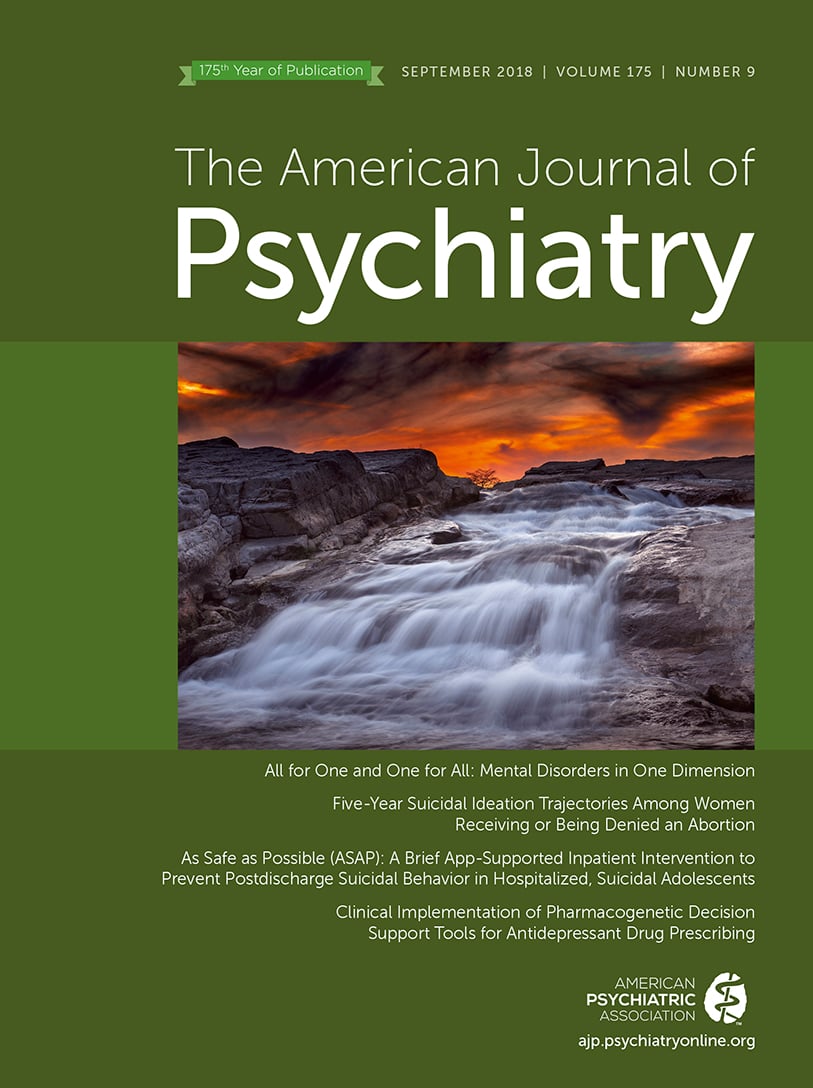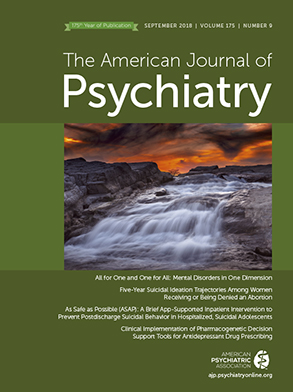Abortion is an issue that inflames passions. Women’s rights advocates point out that an endless number of overwhelmingly male legislators continue to attempt to dictate the choices that women make about their own bodies. Those who fervently oppose abortion consider it murder and continue to attempt to restrict access, sometimes through violence. As of 2016, 11 people, including some physicians, have been murdered in antiabortion violence (
1).
Psychiatry has been misused by those who have opposed abortion and those who consider abortion a woman’s right. In the absence of psychiatric research data, both obtaining an abortion and not obtaining an abortion have been argued to cause psychiatric harm, up to and including suicide. A report in this issue from Biggs et al. on suicidal ideation trajectories over 5 years among women receiving or being denied an abortion (
2) is a much needed and long overdue addition to the psychiatric implications of abortion for those invested in basing psychiatric opinions on scientific evidence rather than politics.
In
Roe v. Wade (1973), the U.S. Supreme Court ruled that women have a constitutional right to abortion (
3). In 2014, approximately 652,000 legal abortions were performed in the United States (
4). Despite
Roe, antiabortion activists and politicians continue to propose and pass legislation that creates conditions for obtaining an abortion so stringent or so shaming that women may be effectively prevented from undergoing the procedure. For example, as of 2017, 26 states require that a woman undergo an ultrasound prior to obtaining an abortion, a procedure not considered a medically necessary component of a first-trimester abortion. Of these, nine states require that the provider offer the patient the opportunity to view the image, and four states require that the provider display and describe the image to the patient (
5).
The role of psychiatry in the abortion debate exemplifies how the absence of data creates situations that lend themselves to the misuse of our profession. In the 1990s and early 2000s, a “postabortion trauma syndrome” with physical and emotional consequences was used to argue against abortion (
6). This syndrome included unexplained depression, “a hardening of the spirit, thwarted maternal instincts (which may lead to child abuse or neglect later in life), intense feelings of guilt, and thoughts of suicide” (
6, p. 2078). This argument was successfully used in a number of states to pass legislation requiring that women be informed that they might suffer from this mental affliction if they chose to undergo an abortion (
7).
Psychiatrists at the time pushed back. “The allegation that legal abortions … cause severe and lasting psychological damage is not borne out by the facts,” Stotland stated (
6, p. 2078). Robinson et al. (
8) concluded, after a critical review of the literature, that only a few studies on this topic were methodologically sound. Of these, the evidence generally indicated that clinically significant adverse symptoms do occur in a minority of women after abortion. Nevertheless, in this group, the strongest predictor of an adverse outcome was mental health prior to the abortion. Thus, the authors concluded, “the most well controlled studies continue to demonstrate that there is no convincing evidence that induced abortion of an unwanted pregnancy is a significant risk factor for psychiatric illness” (
8, p. 276). Despite these arguments, eight states still require that written counseling be provided to women prior to abortion that includes unvalidated information about abortion’s negative psychological or emotional effects (
9).
The misuse of psychiatry has not been limited to antiabortion forces. In
Roe, the Court ruled that states could restrict the right to an abortion after a fetus was viable, except if the health of the mother was in danger. In the companion case of
Doe v. Bolton (
10), which was decided the same day as
Roe, the Supreme Court indicated that the health of the mother could include emotional and psychological factors, opening the door to the use of psychiatry to justify abortions.
In 2009, a state board of medicine retained me to evaluate multiple malpractice claims against two physicians performing third-trimester abortions, one of the most controversial of any abortion procedures. Of the cases I reviewed, several involved rape or incest. Most involved teenagers who tried to keep their pregnancies hidden and consequently were identified as pregnant only in their third trimester. This resulted in referrals to this clinic from all over the country for these difficult-to-obtain late-term abortions.
The two physicians, who were not psychiatrists, diagnosed these teens with depression and/or anxiety. They certified that unless the teens had these abortions, they were in danger of harming themselves and/or committing suicide. No other treatment besides an abortion was considered; no medical records were obtained; no psychiatric consultations were ordered; no psychiatric evaluations were performed; no differential diagnostic process was documented; no therapy or medication was considered as an alternative treatment; and no follow-up psychiatric care was recommended or organized after the procedure. In fact, in the few cases of women who had significant psychiatric histories and documented suicidal ideation prior to their pregnancies, the physicians did not provide abortions. It appeared the physicians feared that these women, with documented histories of self-harming behaviors, might indeed have significant mental health consequences, which the physicians were not prepared to address or treat.
Abortion is not now and has never been a treatment for depression, anxiety, or suicidality, and the physicians’ avoidance of women with documented mental illness made it clear that their mental health diagnoses served only to justify conducting a procedure that would otherwise not have been allowed in that jurisdiction. However, at that time I could not find helpful research on abortion, depression, and suicide. Biggs et al. have helped to fill that gap. Their large, carefully conducted study demonstrates that over a 5-year period, women who had abortions were at no higher risk of having suicidal ideation than women who were denied abortions. No group in the study demonstrated statistically significant differences on any suicidal ideation outcome.
Psychiatry has been misused for social and political purposes in many areas and in many countries. Fortunately, at least for this particular aspect of the ongoing debates about women’s reproductive health, Biggs et al. have produced an elegant study that hopefully will deter proponents of both sides of the abortion issue from misusing psychiatry for their ends.

